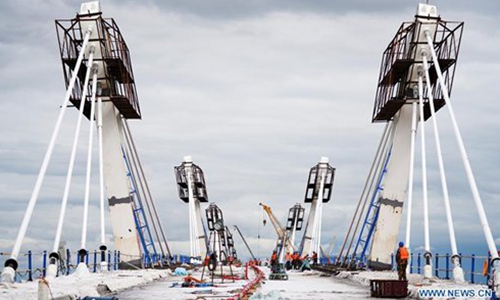HOME >> SOURCE
China, Russia join hands to minimize coronavirus impact: official
Source:Global Times Published: 2020/3/12 17:43:40

Workers work at the construction site of the first highway bridge connecting China and Russia across the Heilongjiang River, on August 19, 2019. Photo: Xinhua
Though the COVID-19 outbreak has hit China-Russia economic and trade cooperation to some extent, the two countries are striving to minimize the impact and ramp up cooperation in sectors like energy, a senior Chinese trade official said on Thursday.The epidemic has had some impact on China-Russia economic and trade cooperation, in particular on services trades like travel; Goods trade, bilateral investment and Chinese-funded projects in Russia have also taken a hit, said Li Xingqian, director of the Foreign Trade Department of the Ministry of Commerce.
But the short-lived virus impact will not alter the fundamentals and long-term momentum of bilateral economic and trade ties and cooperation in the energy sector, including the China-Russia east-route natural gas pipeline which continues to advance, Li told a press conference in Beijing.
China and Russia are maintaining close communications now, and are trying to minimize the virus impact, Li said, noting that the two countries are taking measures to turn the health crisis into opportunity in a bid to advance the sound development of bilateral economic and trade cooperation.
Economic and trade cooperation between China and Russia has continued to develop in the past years. Bilateral trade rose 5.6 percent year-on-year to $17.2 billion in the first two months of 2020, official data showed. Russia is China's ninth-largest trading partner as of February, while it ranked No. 10 in 2019.
The viral pandemic has affected trade activities across the world, including those between China and Europe, and has also disrupted the global industrial chain - but the sound growth prospects in trade between China and the European markets will not change, Li said.
Li called for joint efforts to address the virus impact on the global industrial chain.
To support Chinese firms in fulfilling their contracts for overseas orders, China will provide strong policy support to stabilize foreign trade and improve its export tax rebate policy to reduce the burden on domestic enterprises, said Li.
The work resumption rate in key foreign trade enterprises in 19 provinces including East China's Zhejiang, Jiangsu and Shanghai is approaching 100 percent, according to the country's commerce ministry.
Posted in: ECONOMY